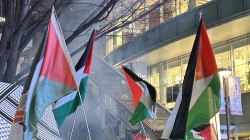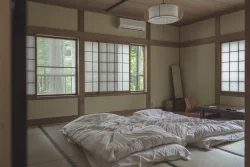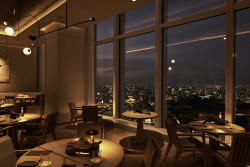
April 29, 2010
Nanjing’s Puzzling Math
Japan and China play a numbers game that both will lose
By Metropolis
Originally published on metropolis.co.jp on April 2010

Illustration by Ben Turner
The gap between Japanese and Chinese perceptions of history—specifically, the events of WWII—is still staggeringly wide. A report released in January, jointly prepared by scholars from both countries after a three-year effort, yielded no agreement over the numbers killed during the Nanjing massacre. Chinese scholars stuck with figures close to those given by postwar tribunals, which ranged from 250,000 to over 300,000, while Japanese scholars used the far-lower figures of 20,000 to 200,000. Once again, the two sides were unable to agree on a common narrative on what happened during the war.
The report was an effort undertaken by the Institute of Modern History of the Chinese Academy of Social Sciences, and the Japan Institute of International Affairs. The idea was to lay the groundwork for increased goodwill, but instead it exposed the deep divisions that underlie relations between the two biggest powers in East Asia.
To be sure, the news wasn’t all bad. During the course of compiling the report, scholars on both sides affirmed that Japan had waged a war of aggression. Thanks to this, Chinese people can finally understand that most Japanese regret the suffering their country caused in East Asia during the war, and that only a clamorous minority of fringe right-wingers assert otherwise.
Nonetheless, the Chinese are still rightly concerned about the failure of Japanese leaders to adequately apologize for World War II. They always “regret” the pain and suffering they caused in East Asia, but never say exactly what they are so sorry over. Nanjing? The years of colonial rule? Comfort women? The government shies away from reciting past crimes, as if they can conveniently be buried along with those who remember the war. This deliberate silence will always give East Asian neighbors further ammunition for Japan-bashing.
At the same time, the casual anti-Japan attitudes of many Chinese can be upsetting. When I was an exchange student, I visited the memorial at Hiroshima with a group of classmates, the majority from Asia. Our reactions were starkly different. I was upset over the horrors my country visited upon that city. But shockingly, my Chinese friend just stared and muttered, “They got what they deserved.” It was an ugly reaction, and scarcely understandable. But it exists, and the Japanese must know where these emotions stem from.
From the 1949 founding of the People’s Republic until 1972, when diplomatic relations were re-established with Japan, ordinary Chinese people never got a proper apology from Japanese leaders, much less reparations. No doubt American policy played a role in this. MacArthur and co. were more concerned with shoring up Japanese strength as a bulwark against the communist threat than with meting out justice, even to the point of rehabilitating war criminals and putting them back into power.
This might have changed in 1972 when the Chinese and Japanese governments sat down and signed a “joint communiqué” that severed Japanese ties with Taiwan and directed them toward the Mainland. But as part of the agreement, the Chinese government waived any rights for individuals to seek compensation for abuses occurring during World War II. While a pragmatic move by the state, it completely ignored the unsettled anger felt over the war. Some people claim that anti-Japanese sentiment is a smokescreen the Chinese government uses to distract the masses from sensitive domestic political topics. But in reality, it is rooted deep within modern Chinese culture—and even the authoritarian government in Beijing has trouble controlling its most virulent outbreaks.
Japan can break the impasse—and must do if it is to be an equal partner in Asia. Indeed, there are gestures Japanese leaders can make that might warm up the chilly atmosphere.
One is to straighten out the situation at Yasukuni Shrine. Ever since 1978, when head priest Nagayoshi Matsudaira quietly enshrined Class A war criminals there, the memorial has provoked ire all across East Asia. Yet Yasukuni is virtually the only place for the Japanese to remember their war dead. A separate, secular memorial dedicated to regular soldiers might be a sensible compromise.
There’s also a tantalizing rumor, reported by both Le Figaro and The Daily Yomiuri, that Prime Minister Yukio Hatoyama is considering a visit to Nanjing sometime this year. Such a trip would offer a fantastic opportunity to dispel accusations that Japan feels no remorse for the war, and it would lay the base for stronger ties in the future. And there is reason to hope that Hatoyama’s more Asia-centric policies will create real progress in relations with its most important neighbor.
This couldn’t come at a more crucial point. With China poised to overtake Japan as the world’s second largest economy by the end of the year, it’s vital that Japanese leaders not let a spat over history cloud the future. Whether the number of Chinese civilians killed was 30,000 or 300,000, Japan committed a crime against humanity at Nanjing, and no one should ever have cause to doubt it.







